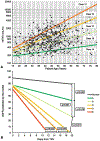Predictors of progression in autosomal dominant and autosomal recessive polycystic kidney disease
- PMID: 33474686
- PMCID: PMC8292447
- DOI: 10.1007/s00467-020-04869-w
Predictors of progression in autosomal dominant and autosomal recessive polycystic kidney disease
Erratum in
-
Correction to: "Predictors of progression in autosomal dominant and autosomal recessive polycystic kidney disease".Pediatr Nephrol. 2021 Sep;36(9):2895-2897. doi: 10.1007/s00467-021-04971-7. Pediatr Nephrol. 2021. PMID: 34160691 No abstract available.
Abstract
Autosomal dominant polycystic kidney disease (ADPKD) and autosomal recessive polycystic kidney disease (ARPKD) are characterized by bilateral cystic kidney disease leading to progressive kidney function decline. These diseases also have distinct liver manifestations. The range of clinical presentation and severity of both ADPKD and ARPKD is much wider than was once recognized. Pediatric and adult nephrologists are likely to care for individuals with both diseases in their lifetimes. This article will review genetic, clinical, and imaging predictors of kidney and liver disease progression in ADPKD and ARPKD and will briefly summarize pharmacologic therapies to prevent progression.
Keywords: Children; Outcomes; Polycystic kidney disease; Progression; Stage 5 chronic kidney disease.
© 2021. IPNA.
Conflict of interest statement
Conflicts of interest
None
Figures



References
-
- Bergmann C, Senderek J, Windelen E, Küpper F, Middeldorf I, Schneider F, Dornia C, Rudnik-Schöneborn S, Konrad M, Schmitt CP, Seeman T, Neuhaus TJ, Vester U, Kirfel J, Büttner R, Zerres K, Abel E, Ala-Mello S, Ausserer B, Bald M, Beetz R, Besbas N, Brandis M, Coulthard M, Dippel J, Garcia CD, Fischbach M, Foged N, Frishberg Y, Gellermann J, Gordjani N, Häffner K, Hennekam RC, Hoppe B, Hoyer P, John U, Kääriäinen H, Kemper MJ, Koivisto P, Krüger G, Kuwertz-Bröcking E, Lambert D, Lennert T, Li Volti S, Mache C, Matthijs G, Mehls O, Meiner V, Misselwitz J, Mononen T, Müller-Wiefel DE, Mustonen A, Özen S, Oliveira JP, Pirson Y, Querfeld U, Rascher W, Rudin C, Santos HG, Schröder M, Seyberth HW, Shalev S, Shohat M, Strehlau J, Vierimaa O, Völpel S, Wilson M, Zimmerhackl B (2005) Clinical consequences of PKHD1 mutations in 164 patients with autosomal-recessive polycystic kidney disease (ARPKD). Kidney Int 67:829–848. 10.1111/j.1523-1755.2005.00148.x - DOI - PubMed
-
- Burgmaier K, Kilian S, Bammens B, Benzing T, Billing H, Büscher A, Galiano M, Grundmann F, Klaus G, Mekahli D, Michel-Calemard L, Milosevski-Lomic G, Ranchin B, Sauerstein K, Schaefer S, Shroff R, Sterenborg R, Verbeeck S, Weber LT, Wicher D, Wühl E, Dötsch J, Schaefer F, Liebau MC (2019) Clinical courses and complications of young adults with Autosomal Recessive Polycystic Kidney Disease (ARPKD). Sci Rep 9:7919. 10.1038/s41598-019-43488-w - DOI - PMC - PubMed
Publication types
MeSH terms
Grants and funding
LinkOut - more resources
Full Text Sources
Other Literature Sources

